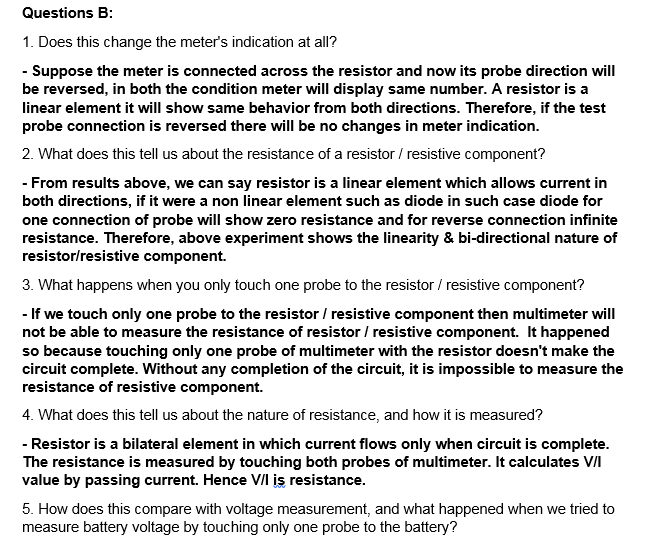5. How does this compare with voltage measurement, and what happened when we tried to measure battery voltage by touching only one probe to the battery?
5. How does this compare with voltage measurement, and what happened when we tried to measure battery voltage by touching only one probe to the battery?
Chapter27: Service-entrance Equipment
Section: Chapter Questions
Problem 44R
Related questions
Question
Kindly answer question #5.

Transcribed Image Text:Questions B:
1. Does this change the meter's indication at all?
- Suppose the meter is connected across the resistor and now its probe direction will
be reversed, in both the condition meter will display same number. A resistor is a
linear element it will show same behavior from both directions. Therefore, if the test
probe connection is reversed there will be no changes in meter indication.
2. What does this tell us about the resistance of a resistor / resistive component?
- From results above, we can say resistor is a linear element which allows current in
both directions, if it were a non linear element such as diode in such case diode for
one connection of probe will show zero resistance and for reverse connection infinite
resistance. Therefore, above experiment shows the linearity & bi-directional nature of
resistor/resistive component.
3. What happens when you only touch one probe to the resistor / resistive component?
- If we touch only one probe to the resistor / resistive component then multimeter will
not be able to measure the resistance of resistor / resistive component. It happened
so because touching only one probe of multimeter with the resistor doesn't make the
circuit complete. Without any completion of the circuit, it is impossible to measure the
resistance of resistive component.
4. What does this tell us about the nature of resistance, and how it is measured?
- Resistor is a bilateral element in which current flows only when circuit is complete.
The resistance is measured by touching both probes of multimeter. It calculates VI
value by passing current. Hence VII is resistance.
5. How does this compare with voltage measurement, and what happened when we tried to
measure battery voltage by touching only one probe to the battery?
Expert Solution
This question has been solved!
Explore an expertly crafted, step-by-step solution for a thorough understanding of key concepts.
Step by step
Solved in 2 steps

Recommended textbooks for you

EBK ELECTRICAL WIRING RESIDENTIAL
Electrical Engineering
ISBN:
9781337516549
Author:
Simmons
Publisher:
CENGAGE LEARNING - CONSIGNMENT

Delmar's Standard Textbook Of Electricity
Electrical Engineering
ISBN:
9781337900348
Author:
Stephen L. Herman
Publisher:
Cengage Learning

EBK ELECTRICAL WIRING RESIDENTIAL
Electrical Engineering
ISBN:
9781337516549
Author:
Simmons
Publisher:
CENGAGE LEARNING - CONSIGNMENT

Delmar's Standard Textbook Of Electricity
Electrical Engineering
ISBN:
9781337900348
Author:
Stephen L. Herman
Publisher:
Cengage Learning